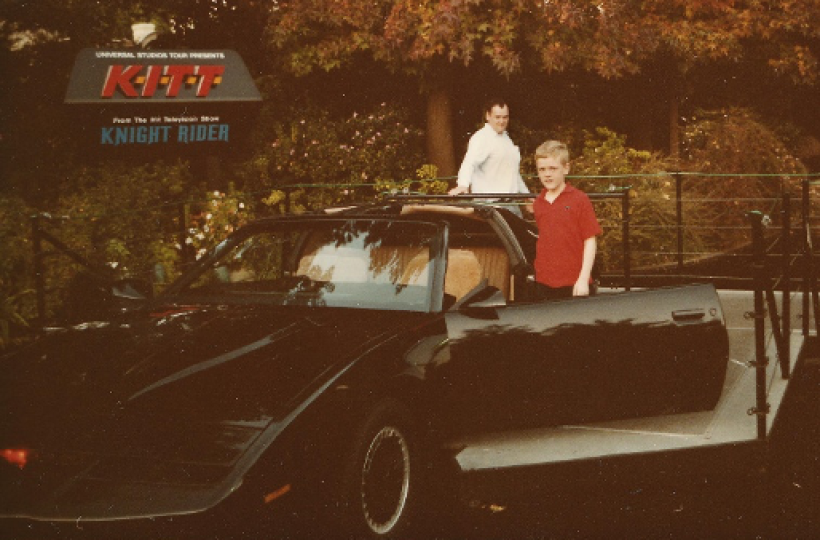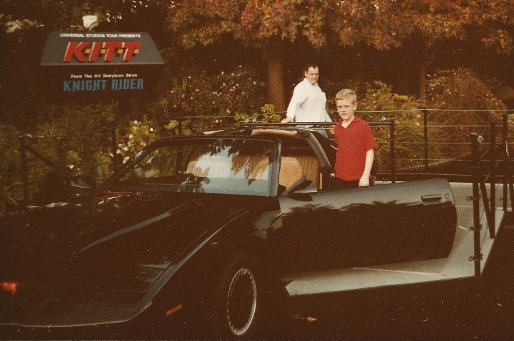Marketing and customer experience lessons from six of my favourite movies & series

What would Joy do? – Inside Out
I’m a big Disney fan, so it should not come as a surprise that I loved Inside Out, a movie about the five personified emotions inside the mind of young girl Riley Andersen, who’s going through a rough time when she moves to another town. Four of her (and of humans in general, actually) basic emotions are negative: Anger, Sadness, Disgust and Fear. That’s pretty unbalanced. It’s also the reason why companies tend to react to customer problems in a very defensive manner which often ends up making the situation worse. Luckily our 5th basic emotion is a positive one, Joy. So I always tell my customers to ask themselves “What would Joy do?”. Because that is how you keep customers happy in ways that they’ll stick around. I, for one, love the example of that car that was left overnight in the parking lot of the restaurant Original Joe’s. Many would complain, and tell them to never do that again (“Just imagine if every customer would do that!”) or worse, have them fined. But instead, Jay McLean, managing partner at Original Joe’s, left a note on the car that said “Just wanted to thank you for leaving your car parked overnight. I’m not sure if you had consumed alcohol at our restaurant or not, but we wanted to thank you for not drinking and driving.” And he offered a voucher for 1 pound of chicken wings “as a thank you for being responsible” ending with “Life is valuable”. Not only did he make one big fan, but the note went viral, offering great free advertising. I really believe that the more you let Joy decide, the happier your fans and customers will become.
Pay it forward
‘Pay it forward’ chronicles 12-year-old Trevor McKinney’s launch of a goodwill movement. When his social studies teacher gives the class an assignment to come up with something to change the world for the better, Trevor launches his “pay it forward” plan. He starts by performing three good deeds and the recipients of his favor also have to do a major favor for three others rather than paying the favor back. His approach is in fact completely related to Joy’s lessons above: you start a movement by doing good without always expecting value in return – like the restaurant owner above – and that positive vibe will spread. But it’s also how innovation works: by sharing your ideas, you make them bigger. And by helping others out, you grow your network, which makes you stronger too. No surprise that “Pay it forward” is deeply rooted in Silicon Valley tech culture, and the reason why it was able to take over the world. Victor W. Hwang and Greg Horowitt even included the concept in their ‘Rules of the Rainforest’ which is “The Unwritten Constitution” of Silicon Valley. It’s crystal clear that today you can’t make it without an ecosystem.
“An offer you can’t refuse” – inspired by The Godfather
I might disappoint some of you by saying that I’m not a big mafia movie fan. But I do agree that “I’ll make him an offer he can’t refuse” from cult crime drama series The Godfather is probably one of the most potent, most cited lines of all time. And I use it all the time in my keynotes. Obviously, I don’t tell my audience to threaten their customers like Don Vito Corleone did with that line (that would be very bad for Joy), but I really like the concept. Especially in these times, where brands are finding it harder than ever to stay visible, or even relevant, they need to find ways to become an offer that their customers will not be able to refuse. And I believe they can do that in three steps: by taking away all friction and helping their customers save precious time; by helping them reach their hopes and dreams; and by solving their worst fears about the world’s biggest problems. You can read all about the latter here.
Oh, and let me tell you a little secret here. My fifth management book will be released this fall and the title will be… ‘The Offer you can’t refuse.”
Just have fun predicting the future – Knight Rider
As a kid, I was a huge fan of Knight Rider. I even have a picture of me as a boy, proudly and slightly uncomfortably posing next to the original KITT. You can even see how much I look like my own dad, who’s also in the background of the picture. For those who don’t know the American action crime drama television series: the KITT car was an advanced artificially intelligent, self-aware, self-driving and nearly indestructible car from the 80s that helped high-tech modern crime fighter Michael Knight (played by David Hasselhoff) save people all over America. Though we’re not there yet, I always love how some visions of the future can be so eerily on the spot (though a lot of course, aren’t). Today, we do have self-driving cars, even though not many are on the road yet. But even more accurate: KITT was a great personal assistant for Michael Knight, just like the Alexas and Google Homes of this world are trying to become. Maybe this could be the best way to try to predict the future: just have fun predicting it, even if your ideas sound crazy or even goofy. People love to talk about Her and Ex-Machina when it comes to AI (which are fantastic movies, don’t get me wrong), but goofy, silly KITT was actually one of the first (yes, not the only one, but he was my favourite) to get it almost right.
Let the most demanding but brilliant customers guide you – Avatar
My friend and business Partner Peter Hinssen wrote about Avatar and Autodesk in his book “The Day After Tomorrow” and it’s a perfect example for this series. Autodesk is an American multinational corporation that makes software services for – among many others – the entertainment industry. One of its most brilliant customers, movie director James Cameron, was also one of its most ‘difficult’ and demanding. It’s in fact a customer that many companies would like to get rid of because “he asks too much and costs us too much money”. But Visiting Research Fellow at Autodesk Mickey McManus isn’t everyone. He saw Cameron as an opportunity for Autodesk: allowing it to learn, grow, innovate and develop new products that they would be able to use for other customers as well. And so it happened that software from Autodesk played a pivotal role in helping Cameron pioneer new methods of virtual moviemaking for his movie Avatar. As Peter wrote: “ a ‘SWAT-team’ of Autodesk software engineers built completely new systems just for Cameron and his crew because they knew that he was the outlier that would show them the ‘Day After Tomorrow’ of their company and thus transform their industry. Together, they literally changed the way movies are made by using digital technology in a way that was impossible just a few years before that.” The movie was a huge success for both Cameron (as one of the highest grossing movies ever) and Autodesk (as an industry pioneer). And Mickey McManus said Autodesk would never have been able to do that without this customer that a lot of companies would probably just have refused to help. Mickey followed Joy’s advice, too, it seems. (I’m sensing a theme here, even if I did not set out to do so when I started writing this.)
I had the pleasure to interview Mickey about his vision on the future. I just love his mind blowing vision on things. Check out the video to listen to every word of our conversation.
Avoiding ‘Temptation Island’ marketing – The Truman Show
The Truman Show is a 1998 American science fiction comedy drama which stars Jim Carrey as Truman Burbank. The latter was adopted and raised by a corporation inside a simulated television show revolving around his life, until he discovers it and decides to escape. Basically, without knowing it, Truman is constantly observed by millions of people, just for their entertainment. Everything in his world is orchestrated. Though it’s a fun movie, too, the underlying meaning is of course very bleak. At the time, it was a warning against using people for entertainment value, as reality shows were becoming so popular. It has not come true, of course, at least not the entertainment-against-one’s-wish part but the openness and transparency of human life that the film shows are becoming part of the game. Weirdly, this transparency often seems to be lacking in our interaction with our closest network of friends and family on social media: though we seem to be sharing everything there, we tend to orchestrate it too and show only the best parts of our lives. But when it comes to (certain) governments (like the Chinese), tech companies, social media providers, e-commerce websites, healthcare tech providers, etc., there is no orchestrating possible: they can monitor our faces, our online behaviour, our heartrate, how much we move, where we move, what we buy etc. We are arriving at a point where governments and companies sometimes know more about us than our friends and family. And this is unleashing the ‘Temptation Island’ – yes, that is also a reality show – for marketers that I have been talking about for quite a while now in my presentations: the more marketers know about the customer, the better they will be able to manipulate us into unhealthy (literally and figuratively) behaviour. Ethics will become huge in the following years. Already in 2018, a survey by Deloitte of 1,400 U.S. executives knowledgeable about artificial intelligence (AI) found that 32% ranked ethical issues as one of the top three risks of AI. And that number will only rise, and we’ll see more and more Chief Ethics Officers like those of the U.S. Bank, Airbnb or SAP.
Brands solving world problems – The Day After Tomorrow
Those who know Nexxworks, will be aware of the fact that three of its partners Peter Hinssen (The Day After Tomorrow), Rik Vera (Managers The Day After Tomorrow) and I (Customers The Day After Tomorrow) wrote a ‘Day After Tomorrow’ book series, of which the core idea was that you need to invest 70% in Today, 20% Tomorrow and 10% in the Day After Tomorrow if you want to keep your company relevant. But I don’t want to talk about that here. I do want to talk about the eponymous 2004 American disaster movie about global cooling and a new ice age with catastrophic consequences. It’s not a very realistic or scientific movie, but it is so relevant because we are currently dealing which huge climate-related problems. Where companies used to only think about their own DAT (to avoid confusing, I’ll use DAT when I talk about the nexxworks Day After Tomorrow concept). Today, they have to think about our planet’s DAT, and that of its inhabitants. As I pointed out before, brands that want to stay relevant will have to go beyond selling products and help solve world problems, by for instance investing in plastic-free products (Dove), humane (slave-free) production (Tony Chocolonely’s) or even carbon negativity (Microsoft). To safeguard their own DAT, brands will need to secure our planet’s DAT together. And we’ll only be able to do that if we all work together towards a better future.

